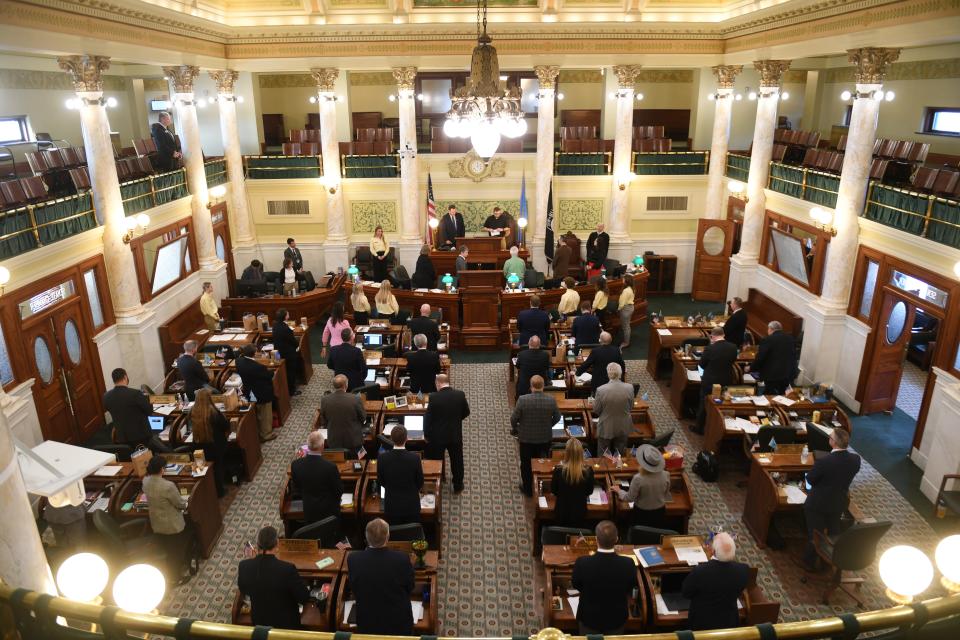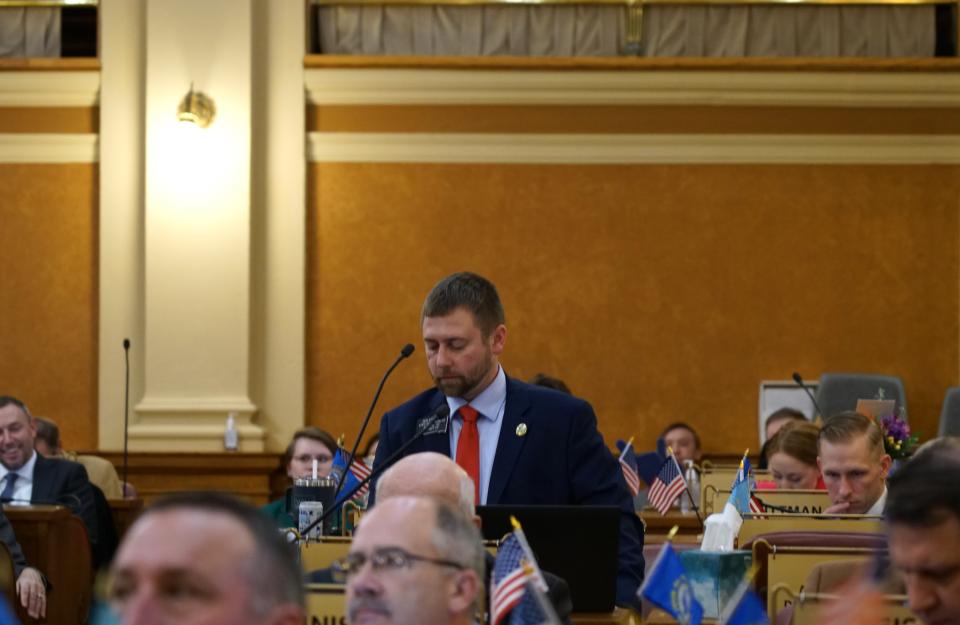Senate committee OK's restitution payments bill; kills bill on penalty for raping a child
PIERRE — Senate judiciary members heard two bills Thursday that would impact children, and each bill had widely different results.

First was HB 1195 which passed unanimously, and would allow for restitution payments to the children left behind after their parent is killed by a drunk driver. The second, HB 1192, would’ve upped the penalty for raping a child, and was soundly defeated after intense questioning on what constitutes as rape.
Here’s how the arguments went down.
People convicted of vehicular manslaughter should pay restitution to children left behind
That’s what Rep. Kaydn Wittman, D-Sioux Falls, pushed for in her bill, HB 1195.
The bill laid out steps for the families of children left behind when a parent is killed by a drunk driver to receive restitution payments that can be used for childcare, education, custody arrangements and more. Wittman said part of the inspiration from the bill came from her own personal tragedy, when a close friend was killed by a drunk driver and left behind three children.

“I remember talking to her husband afterward and him wondering how they were going to pay for childcare, and that they were on her health insurance and he had no idea how they were going to survive,” she said.
Those who are incarcerated after the crime would be responsible for all bills accrued during their prison time and be set on a path for payment once they leave prison.
Wittman reiterated to the senators that the bill language didn’t make the restitution payments mandatory. Instead, a judge will be able to decide if a person convicted of vehicular homicide should make the payments.
Over 20 states have passed similar laws, including Tennessee and Kentucky. Wittman said that the bill passed in Tennessee has actually served as a deterrent for drunk driving.
More: Lincoln County men's prison cost estimates could total over $567M before ground is broken
Sen. Jim Melhalff, R-Pierre, said that the bill made sense and provided a “fall back” when wrongful death civil payments aren’t an option.
HB 1195 now heads to the Senate floor for a vote as part of the consent calendar.
Raping a child and going to prison for life too much of a punishment for a ‘broad’ crime
Initially, HB 1195 would have enhanced the penalty of raping a child from a class C felony, meaning up to life in prison, to a class A felony, when the death penalty can be sought by a willing prosecutor. Rep. Ben Krohmer, R-Mitchell, said that the state should take a serious stance against the rape of the child and stand behind a serious penalty.
More: Lawmakers debate upping penalty for person convicted of child rape in South Dakota
However in House debate, the bill was amended down to a class B felony, meaning a person convicted of raping a child under 13 would have a mandatory life in prison sentence.
That sentencing was too strong of a punishment for senators on Senate Judiciary Thursday.
Newcomer Sen. Michael Walsh, R-Rapid City, who was appointed after former Sen. Jessica Castleberry resigned, questioned Krohmer on the definition of rape and the definition of sexual penetration.
Krohmer read the criminal statute definition, “sexual penetration means an act, however slight, of sexual intercourse” before Walsh cut him off.
“The term I’m interested in hearing your opinion on is ‘however slight,” Walsh said, adding that when people tend to think of child rape, they think of an act that is graphic and forceful. “Can you think of an instance when ‘however slight’ might also fit under this definition?”

Krohmer said that the current law referenced examples that he wasn’t willing to repeat in committee testimony.
Walsh asked if Krohmer would agree that however slight could include a portion of a finger.
“It does list that,” Krohmer said, struggling to find in his words a “PG way” to answer the question.
Walsh clarified asking if however slight included a spectrum from digital penetration all the way up to sexual penetration of a child.
“I would agree,” Krohmer said.
Sen. David Wheeler, R-Huron, during discussion of the bill referenced Walsh’s line of questioning on the broad nature of rape and sexual penetration.
More: Bill to create extra funding for SD's indigent defense office stumbles at the start
“To say that every single one of them is the same sentence and that’s a max of life is difficult for me,” Wheeler said. “It will make prosecutions harder. It will cause more victims to have to testify because it removes any incentive to deal. Every case will go to trial.”
The lone no vote came from Sen. Brent Hoffman, R-Hartford, who said that the bill wouldn’t remove prosecutorial discretion to bring other charges before the case goes to trial. He also doubted that a case had been tried on the basis of slight penetration without compelling evidence.
HB 1195 was moved to the 41st Day, a non-existent legislative day, with a vote of 5-1.
This article originally appeared on Sioux Falls Argus Leader: Senate committee approves Bentley and Mason's law in South Dakota

